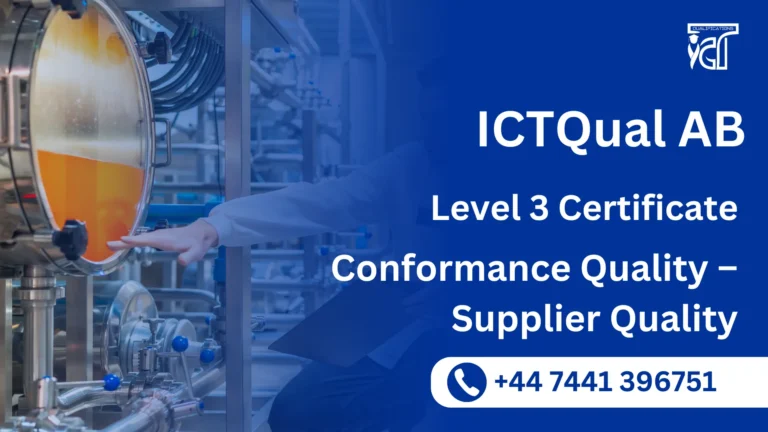The ICTQual International Level 6 Diploma in Airport Management is a prestigious qualification designed for professionals who aspire to take on advanced leadership roles within the aviation and airport industry. This ICTQual International Level 6 Diploma in Airport Management provides learners with the knowledge, skills, and strategic insights required to manage complex airport operations, ensuring efficiency, safety, and customer satisfaction in a highly competitive global sector. By combining academic rigor with practical industry relevance, the diploma prepares candidates to excel in senior management positions across airports, airlines, and aviation authorities.
One of the key strengths of this diploma is its focus on developing advanced management capabilities tailored specifically to the aviation environment. Learners gain expertise in areas such as airport planning, operations management, safety regulations, financial control, and customer service excellence. The curriculum is designed to address the challenges of modern airports, including sustainability, technological innovation, and global regulatory frameworks. This ensures that graduates are not only equipped with theoretical knowledge but also with the practical tools to make strategic decisions that drive organizational success.
The ICTQual Level 6 Diploma in Airport Management is ideal for professionals who already have experience in the aviation sector and are ready to progress into higher-level responsibilities.ICTQual International Level 6 Diploma in Airport Management also serves as an excellent pathway for those who have completed a Level 5 qualification or equivalent and wish to advance their academic and professional journey. With its international recognition, the diploma opens doors to career opportunities worldwide, making it a valuable credential for ambitious learners seeking global mobility.
ICTQual International Level 6 Diploma in Airport Management
This qualification, the ICTQual International Level 6 Diploma in Airport Management, consists of 6 mandatory units.
- Advanced Strategic Management in Airport Operations
- Global Airport Policy, Governance, and Regulation
- Airport Technology, Innovation, and Digital Transformation
- Airport Planning, Design, and Infrastructure Development
- Aviation Logistics, Cargo, and Supply Chain Management
- Research Methods in Airport and Aviation Management
Learning Outcomes for the ICTQual International Level 6 Diploma in Airport Management:
Advanced Strategic Management in Airport Operations
Learners will:
- Understand and apply advanced strategic management frameworks within the context of airport operations.
- Evaluate the impact of global trends, competition, and market forces on airport business performance.
- Develop strategies to optimise operational efficiency and enhance stakeholder satisfaction.
- Analyse leadership approaches and their influence on airport organisational culture and productivity.
- Formulate business continuity and growth strategies for large-scale airport environments.
- Assess risk management models for improving operational resilience and sustainability.
- Integrate innovation and data-driven decision-making into airport management practices.
- Critically review performance metrics to ensure continuous improvement in airport operations.
Global Airport Policy, Governance, and Regulation
Learners will:
- Examine international aviation laws, treaties, and regulatory frameworks governing airport management.
- Understand the roles of global aviation organisations and regulatory bodies in maintaining safety and compliance.
- Evaluate the influence of government policies and geopolitical factors on airport operations.
- Analyse ethical, legal, and environmental obligations in global aviation governance.
- Develop policies and procedures aligned with international standards and best practices.
- Assess regulatory compliance strategies for safety, security, and sustainability.
- Explore the relationship between global policy shifts and airport business development.
- Apply governance principles to promote transparency and accountability within airport operations.
Airport Technology, Innovation, and Digital Transformation
Learners will:
- Explore the integration of emerging technologies such as AI, IoT, and automation in airport operations.
- Assess the impact of digital transformation on passenger experience and operational efficiency.
- Understand data management systems, cybersecurity, and digital infrastructure within airport environments.
- Evaluate the use of smart technologies in airside and landside management.
- Develop strategies for digital innovation and process optimisation in aviation.
- Examine the role of innovation in sustainable airport development.
- Identify challenges in implementing new technologies and propose viable solutions.
- Analyse future trends shaping airport innovation and smart airport ecosystems.
Airport Planning, Design, and Infrastructure Development
Learners will:
- Understand principles of airport master planning and infrastructure design.
- Analyse factors influencing terminal layout, runway design, and airside efficiency.
- Evaluate sustainable construction and development practices in airport projects.
- Assess the impact of passenger growth, cargo operations, and regulatory constraints on airport planning.
- Develop long-term infrastructure strategies aligned with operational and environmental goals.
- Explore the integration of technology into airport design for improved performance.
- Identify best practices in project management for large-scale airport developments.
- Examine case studies of successful global airport expansion and innovation.
Aviation Logistics, Cargo, and Supply Chain Management
Learners will:
- Understand logistics operations within the global aviation supply chain.
- Analyse the relationship between airport management and air cargo operations.
- Evaluate strategies for enhancing efficiency in ground handling and freight management.
- Examine international trade regulations affecting cargo logistics.
- Develop skills to manage inventory, warehousing, and supply chain coordination.
- Assess the role of digital tracking and automation in aviation logistics.
- Explore sustainability and risk management in global supply chain networks.
- Formulate strategies for optimising cost, speed, and quality in airport logistics.
Research Methods in Airport and Aviation Management
Learners will:
- Understand research methodologies relevant to aviation and airport management studies.
- Develop skills to design and conduct independent research projects.
- Identify suitable qualitative and quantitative data collection techniques.
- Critically evaluate literature, theories, and industry data to support evidence-based conclusions.
- Analyse data using appropriate statistical and analytical tools.
- Formulate research questions addressing contemporary challenges in airport management.
- Present findings effectively to both academic and professional audiences.
- Apply ethical principles in aviation research and data handling.
The ICTQual International Level 6 Diploma in Airport Management is designed to prepare learners for senior leadership roles in the aviation industry. ICTQual International Level 6 Diploma in Airport Management equips participants with advanced knowledge of airport operations, governance, and strategy, enabling them to manage complex challenges in a globally competitive environment.
1. Global Recognition and Career Advancement
- Internationally respected qualification that enhances employability across the aviation sector
- Opens pathways to senior management and leadership roles in airports and aviation organizations
- Provides a competitive edge in a rapidly evolving global aviation market
- Builds credibility with employers, regulators, and industry stakeholders
2. Advanced Strategic and Operational Expertise
- Develops skills in airport governance, financial planning, and aviation law
- Equips learners to handle crisis management and risk assessment effectively
- Strengthens ability to analyze complex airport systems and optimize operations
- Focuses on sustainability and innovation, aligning with modern aviation priorities
3. Leadership and Management Development
- Enhances decision-making and problem-solving capabilities for high-pressure environments
- Builds confidence to lead cross-functional airport teams with efficiency
- Strengthens communication and negotiation skills for stakeholder engagement
- Encourages ethical leadership and responsible management practices
4. Practical Industry Relevance
- Curriculum designed with real-world case studies and scenarios
- Provides insights into current aviation trends and regulatory frameworks
- Bridges the gap between theory and practice in airport management
- Prepares learners to implement innovative solutions for operational challenges
5. Pathway to Further Education and Professional Growth
- Serves as a stepping stone to postgraduate studies in aviation or management
- Enhances eligibility for professional certifications in aviation and transport
- Encourages lifelong learning and continuous professional development
- Expands professional networks through global recognition of the qualification
The ICTQual International Level 6 Diploma in Airport Management is tailored for ambitious professionals who aspire to take on senior roles in the aviation industry. The ideal learner is someone who combines a passion for aviation with the drive to lead, innovate, and manage complex airport operations in a global context.
1. Aviation and Management Professionals
- Current airport or airline staff aiming to progress into senior management roles
- Professionals with experience in aviation operations, logistics, or customer service
- Individuals seeking to transition from supervisory to strategic leadership positions
- Managers who want to broaden their expertise in governance, finance, and compliance
2. Aspiring Leaders with Strategic Vision
- Learners motivated to shape the future of airport management
- Individuals who enjoy problem-solving and decision-making in high-pressure environments
- Professionals eager to develop long-term strategies for sustainable airport growth
- Those who want to influence policy and innovation within the aviation sector
3. Graduates and Mid-Career Professionals
- University graduates in aviation, business, or management disciplines
- Mid-career professionals looking to upgrade their qualifications for career advancement
- Learners seeking an internationally recognized diploma to boost employability
- Individuals aiming to bridge academic knowledge with practical industry expertise
4. Globally Minded Individuals
- Learners interested in working across international airports and aviation hubs
- Professionals who value cross-cultural communication and global networking
- Those who want to align with international aviation standards and regulations
- Individuals seeking to expand their career opportunities worldwide
5. Lifelong Learners and Innovators
- People committed to continuous professional development in aviation management
- Learners who embrace new technologies and sustainable practices in airports
- Innovators who want to implement creative solutions to operational challenges
- Individuals passionate about driving efficiency, safety, and customer satisfaction
The ICTQual International Level 6 Diploma in Airport Management opens multiple future progression opportunities for learners. Graduates can advance into senior professional roles, pursue higher academic qualifications, or specialize further within the aviation and transport sectors.
1. Career Advancement in Aviation Management
- Progress into senior airport management roles such as Airport Director, Operations Manager, or Aviation Consultant
- Take on strategic leadership positions in airlines, civil aviation authorities, or ground handling companies
- Enhance employability in international airports and aviation hubs worldwide
- Gain recognition as a specialist in governance, safety, and operational excellence
2. Pathway to Higher Education
- Acts as a bridge to Level 7 Diplomas in Strategic Management or Aviation Leadership
- Strengthens academic profile for doctoral research in aviation, transport, or business management
- Expands opportunities for academic teaching and training roles in aviation institutes
3. Professional Certifications and Memberships
- Supports entry into professional aviation bodies and associations
- Enhances eligibility for specialized certifications in safety, security, and airport operations
- Builds credibility for chartered management status or equivalent professional recognition
- Encourages continuous professional development through industry-recognized credentials
4. Diversification into Related Industries
- Opens career pathways in logistics, supply chain, and transport management
- Provides transferable skills for tourism, travel, and hospitality sectors
- Equips learners to work in aviation consultancy and regulatory compliance
- Enables movement into sustainability and innovation roles within global transport systems
5. Entrepreneurial and Consultancy Opportunities
- Equips learners to establish aviation consultancy firms or advisory services
- Provides expertise to develop airport projects and infrastructure planning
- Encourages entrepreneurship in aviation technology, training, and service solutions
- Builds capacity to act as an independent expert for international aviation projects
Entry Requirements
Learners must meet the following criteria to be considered for admission into the course.
Age Requirement: Applicants are typically expected to be 21 years or older to demonstrate maturity and readiness for advanced study.
Educational Background: A Level 5 Diploma or equivalent qualification in aviation, business, or management; alternatively, a bachelor’s degree in a related discipline may be accepted.
Professional Experience: Minimum of 3–5 years of relevant work experience in aviation, airport operations, or management roles; supervisory or mid-level management experience is preferred.
English Language Competency: Proficiency in English demonstrated through IELTS 6.0 (or equivalent), or evidence of prior education delivered in English.
Register Now
Qualification Process
Qualification Process for the ICTQual International Level 6 Diploma in Airport Management
- Self-Assessment:
Begin by evaluating your eligibility to ensure you meet the qualification requirements, including work experience, knowledge, and language proficiency. - Registration:
Complete your registration by submitting the required documents, including a scanned copy of a valid ID, and paying the registration fee. - Induction:
An assessor will conduct an induction to confirm your eligibility for the course and explain the evidence requirements. If you do not meet the criteria, your registration will be cancelled, and the fee will be refunded. - Assignments & Evidence Submission:
Provide all assignments and the necessary evidence based on the assessment criteria outlined in the course. If you are unsure of the required evidence, consult with the assessor for guidance on the type and nature of evidence needed. - Feedback and Revision:
The assessor will review your submitted evidence and provide feedback. Evidence that meets the criteria will be marked as “Criteria Met,” while any gaps will be identified. You will be asked to revise and resubmit if needed. - Competence Evidence:
Submit final evidence demonstrating that all learning outcomes have been met. This evidence will be marked as “Criteria Met” by the assessor once it is satisfactory. - Internal Quality Assurance (IQA):
The Internal Quality Assurance Verifier (IQA) will review your evidence to ensure consistency, quality, and compliance with standards. - External Verification:
The IQA will submit your portfolio to ICTQUAL AB External Quality Assurance Verifiers (EQA) for final confirmation. The EQA may contact you directly to verify the authenticity of your evidence. - Certification:
Upon successful completion of all checks, ICTQUAL AB will issue your official certificate, confirming that you have attained the ICTQual International Level 6 Diploma in Airport Management.






